The Island of Sea Women Read online
Page 19
The girl breaks into a grin. “Don’t get me wrong. I love to travel.”
“Me too,” Young-sook admits, glad to be on safer ground.
Clara’s eyes widen, as if she hadn’t thought of this possibility. “Where have you gone?”
Is it curiosity or impudence?
“I’d gone to three countries by the time I was twenty—Japan, China, and Russia. I went back to China last year. I’ve gone to Europe. The United States too. I liked the Grand Canyon and Las Vegas. What about you?”
“Oh, the usual places. We live in Los Angeles, so it’s easy to go to Mexico or Hawaii on vacation. But we’ve also gone to France, Italy, Switzerland—”
“Switzerland? I’ve been there!”
“Figures. Switzerland and all—”
“Have you read Heidi?” Young-sook asks.
The girl tilts her head like she’s a bird and gives Young-sook a quizzical look. “I was named for a character in the book.”
“Clara, of course.”
“I’m not in a wheelchair, though. Don’t you think it’s . . .” She breaks off for a moment, trying to find the right Jeju word. Finally, she says, in English, “Weird?” Young-sook has heard her great-grandson use this word, so she recognizes it. “Weird,” Clara repeats before switching back to the Jeju dialect, “to be named for a character who’s disabled?”
Suddenly, a memory of hearing the story read aloud shears through Young-sook’s brain. She wants to go home, swallow some white diving powder, lie down, and close her eyes. “But Heidi helps Clara recover,” she manages at last. “The Alps. Goat milk. Grandfather.”
“You seem to know a lot about it,” Clara says.
Young-sook changes the subject. “I have to work.”
“Can I help?”
Young-sook surprises herself by nodding.
They pick their way over the rocks until they find a patch of sand. Young-sook straps her cushion to her behind and lowers herself until she’s sitting with her knees drawn up to her shoulders. The girl squats, and those shorts . . . Young-sook averts her gaze.
“You work pretty hard for a grandma,” Clara says.
Now it’s Young-sook’s turn to shrug.
Seeing she’s not going to get more of a response, Clara prompts, “So you travel . . .”
“A lot of haenyeo my age travel together. See those two women? They’re sisters. We’ve gone lots of places.”
“But you’re still working. Don’t you ever want to treat yourself? With something other than travel, I mean.”
“How do you know I don’t treat myself?” But the truth is the idea seems foreign to Young-sook. She worked to help her brothers and sister, support her father until his death, grow vegetables, and bring home seaweed and turban shells for her children, grandchildren, and great-grandchildren to eat. She fills the lengthening silence. “We have a saying: The granny who weaves on a loom as her work has five rolls of cloth in her old age, but the granny who dives all her life doesn’t even have proper underwear. I began with empty hands. I’ll never forget the memory of being hungry, but the saying is wrong. I was able to help my children go to school and buy them houses and fields.” She glances at the girl, who stares back at her, still wanting more. “I have plenty of underwear too!” This brings a smile to Clara’s face, and Young-sook goes on. “I couldn’t be more content than I am now.”
“There must be something you’ve wanted—”
Young-sook finds herself trying to answer. “I wish I could have had an education. If I’d learned more, then I could have helped my children more.” She glances over to Clara to see how the girl is taking the response, but her head is bent as she picks through seaweed dotted with bits of plastic. She’s fast, efficient in her movements. When she doesn’t come back with a follow-up question, Young-sook answers the one she wishes Clara had asked. “So maybe I did more than I’ll admit, because my children and grandchildren have accomplished a lot. My son owns a computer business in Seoul. I have a grandson who’s a chef in Los Angeles, and one of my granddaughters is a makeup artist—”
This brings forth a spiral of giggles.
“Why is that so funny?” Young-sook asks.
Clara leans forward as if to confide. “Someone’s tattooed your eyebrows and lips.”
That stings, because all haenyeo Young-sook’s age have done this. Her great-grandson called it, in English, a fad. Just as her dyed and permed hair is a fad.
“Hyng,” Young-sook bristles. “Even an old woman wants to look beautiful.”
The half-and-half girl giggles. The old woman knows what she’s thinking: Weird!
Young-sook’s patience evaporates. “Why are you here anyway?”
“Here?”
Young-sook spells it out. “On my beach.”
“My mother sent me. You’ve got to know that.”
“I can’t help her.”
“Can’t or won’t?”
“Won’t.”
“That’s what I told her.”
“Then why are you here?”
It’s a simple question, but the girl goes in a different direction. “Your kids and their families, who live in other places, do you see them often?”
“I already told you I’ve gone to America. My grandson has me come every other year—”
“To Los Angeles—”
“Yes, Los Angeles. And I go to the mainland to visit the family who live there. Then every spring, the whole family comes here. It’s been my privilege to introduce each of my grandchildren and great-grandchildren to the sea.”
“How deep can you go?”
“Now or back when I was the best haenyeo?”
“Now.”
Young-sook spreads her arms out wide. “Fifteen times this.”
“Would you ever take me in the water? I’m a good swimmer. Have I told you that yet? I’m on the swim team at my school . . .”
PART III
Fear
1947–1949
The Shadow of a Nightmare
March–August 1947
Immediately after the war, we had great hopes for independence, but the Japanese colonists had merely been replaced by American occupiers through the United States Army Military Government in Korea. Each morning and every evening, Jun-bu turned on his transistor radio. We heard Americans speaking in their language and others translating for them. They seemed to have come to the same conclusion that the Japanese had reached long ago: Jeju had a great strategic location. The island was now an American stepping-stone, only this time it led to the USSR, so instead of Japanese regiments, we had the Americans’ 749th Field Artillery, the Fifty-first Field Artillery, the Twentieth Regiment of the Sixth Division, and the Fifty-ninth Military Government Company. The commander of the government group, Major Thurman A. Stout, became Jeju Military Governor Stout. He ruled side by side with Park Gyeong-hun, who’d been appointed as the Korean governor. The People’s Committees opposed this, since neither man had been elected, but they were powerless to make a change. Governor Stout made lots of speeches, but the radio also had interviews with Captain Jones, Captain Partridge, Captain Martin, and captain, captain, captain. One day, Governor Stout announced, “In the interests of a peaceful and effective transfer, we’re asking officials from the former administration to return to their jobs. We also welcome all former policemen to work with us.”
“But every one of them is a former collaborator!” Jun-bu fumed. He wasn’t the only one to be upset. Most people took these moves to mean that the Americans were siding with the right-wingers and that the administration of the island—and small villages—would shift away from the People’s Committees to the police and constabulary. It was as if the Americans didn’t understand what they’d inherited.
But anger can be dangerous and have unintended consequences. The relationship between Governor Stout and the People’s Committees continued to sour. At the same time, recruitment posters for the Ninth Regiment of the Korean Constabulary were distributed to every vill
age. Jun-bu read one of them to me: “The Korean Constabulary is neither a right-wing nor a left-wing organization. It is a patriotic military agency for youngbloods who love their comrades and are willing to die for their country. We are not the hunting dog of a certain country. We are not the puppet of a certain political party. We are simply the bulwark of the state, which tries to pursue Korea’s independence and defend our beloved homeland.” The constabulary’s actions, however, sent a clearer message. Its troops, many of whom had served in the Imperial Japanese Army, moved into the barracks at the former Japanese Navy Air Service air base in Moseulpo, which sent outrage around the island.
Through it all, people struggled to understand what the other side was saying. So much so that the U.S. military government opened an English academy. Men who’d been conscripted by the Japanese, had worked as collaborators, or had been educated abroad, were encouraged to sign up, which Jun-bu and Sang-mun did. As Jun-bu explained his decision to me, “How can I help change things if I sit by and do nothing?” I thought of my husband as being very smart, but he did not excel in learning this new language. Every night, he struggled with the lessons. Even the children and I picked up the basic sentences faster and better than he did, reciting the lines back and forth to each other like a call-and-response haenyeo song. Hello . . . Hello! What is your name? My name is . . . Do you have . . . Yes, I do . . . Where is . . . Turn right at . . .
Sang-mun, whom I did not respect, grasped the language so quickly that the Americans hired him to do almost the same job he’d done for the Japanese. He managed their supplies, making sure they were delivered from the port or airfield to the proper base or warehouse. They gave him a house to live in at their facility in Hamdeok, which was only three kilometers from Bukchon. He was on the road a lot, often staying away for nights at a time. Perhaps this is why Mi-ja did not become pregnant again, while I was just getting over another bout of morning sickness. No one could believe my belly had a third baby in it already, when Min-lee was about to turn two and Sung-soo was only nine months old. Sure, the haenyeo I dove with teased me, but I felt proud. I wished, though, that Mi-ja and I could be pregnant again together as we’d been during leaving-home water-work. I’d felt so close to her then and was certain Min-lee and Yo-chan would always be close as a result.
During Sang-mun’s long absences, Mi-ja walked through the olles to Bukchon with her son, and I’d veer toward Hamdeok on my way home from the bulteok so we could meet halfway—almost as we had done in Hado when we were young girls.
“I brought in two nets filled with sea urchins today,” I might say.
And she might respond with “I made kimchee.” Or washed clothes, dyed cloth, or ground grain.
Sometimes I’d come around the bend and see her with her arms resting on top of the stone wall, staring out to sea.
“Do you miss diving?” I might ask.
“The sea will forever be my home,” she always answered.
Once I saw bruises above her wrist. A man does not change with marriage, and I had my suspicions about Sang-mun, but I was hesitant to ask about him directly. One day I gathered my courage and made a more general inquiry. “Are you happy?”
“You and I are finally living with our husbands,” she replied. “We know things about them we didn’t know in those first few weeks of marriage. Sang-mun snores sometimes. He farts when he eats too much turnip. Often, when he comes home, I can tell he’s been drinking. It’s not our rice wine, but something he has with the Americans. I can’t stand the smell.”
These were nothing answers. She knew it. I knew it.
“I should be going home now,” she said, then called to her son. I watched them walk up the olle until they were out of sight.
* * *
As a haenyeo, wife, and mother, I focused on diving, my husband, my two children, Yu-ri, and the new baby to come. We enter the netherworld to earn our living and return to this one to save our children. We haenyeo are ruled by the moon and tides, but we’re also affected by various sets of three: The abundance of wind, rocks, and women. The lack of thieves, gates, and beggars. The three-step farming system that gives our pigs food from our behinds, fertilizer for our dry fields from the pigs’ behinds, and a pig that can eventually be eaten. We didn’t talk about it often, but Jeju was also known as the Island of the Three Disasters—wind, flood, and drought. Wind, again, always, and forever.
Now we had a new set of Three Disasters. First, another cholera epidemic broke out. Grandmother died. It hurt to lose her. It hurt even more that I hadn’t been able to care for her in her final hours. Mi-ja also lost her aunt and uncle. Second, the fall harvest was extremely poor. The crops that sustained us—millet, barley, and sweet potatoes—failed. We were instructed to go to American distribution points to pick up bags of grain, but the former Japanese collaborators, who’d been put in charge of rationing, stole these provisions to sell on the black market. Within forty-five days, the price of rice doubled, not that we could ever afford to buy rice for more than the New Year’s celebration. At the same time, the price for electricity—in those few places on the island that had it—jumped fivefold.
And third, people began to go without other staples. Jeju’s population had doubled with those who’d returned from Japan since liberation and refugees from the north since the division of the country, but the Americans forbade us to trade with our former occupiers, which meant haenyeo families had no money to buy food. There were days when we squeaked by on a mixture of seaweed and barley bran. Other families subsisted on the potato pulp usually given to pigs, so even those beasts had to get by on less. On the mornings when I didn’t dive, I strapped Sung-soo to my back and—with Min-lee and Yu-ri trailing behind me—joined other mothers on the rocky shore to search for sand crabs to make into love-from-a-mother’s-hands porridge. Anytime one of the children found one, a squeal would ring out almost like a sumbisori. I spent long afternoons picking the meat from those tiny shells to make the porridge.
Mi-ja and I agreed to stay out of political discussions even as events roiled around us. On the radio we heard Colonel Brown, a new American in charge, tell us that the long-range goal for Jeju was “to offer positive proof of the evils of communism” and “to show that the American way offers positive hope.”
“Only one problem,” Jun-bu grumbled. “They want us to accept their form of democracy, with an American-backed dictator who can be controlled, while the people of Korea—especially here on Jeju—want to hold our own elections, with our own slate of candidates, so we can vote our own way. Isn’t that what democracy is supposed to be about?”
He took this a step further when Mi-ja and her family came to visit. “We should shove out the Americans like we did the French missionaries,” he stated, sure of his position.
“That was a small rebellion decades ago,” Sang-mun argued back. “The Christians are still here, and more are coming now that the Americans have arrived.”
“But we should be independent! If we don’t stand up for what we believe, then we are guilty of collaborating in our hearts.”
Collaborating. That word again.
On one matter Sang-mun appeared to agree. “At the very least we should have free elections.” But then he warned, “Free elections or not, let me tell you something, friend. You should be careful. You’re a teacher. Too much trouble gets stirred up in schools. Remember what they did to the women organizers from the Hado Night School and to their teachers?”
They were all dead, but I didn’t worry because my husband wasn’t an organizer, and he wasn’t going to lead a revolt. Besides, we had more practical things to worry about, like how we were going to feed our children.
One thing led to another, though, and people—organized by the newly formed South Korean Labor Party—began to plan a nationwide demonstration to take place on March 1, 1947, nineteen months after the war ended and on the same date that my countrymen had once held gatherings to promote independence from Japan. Here on Jeju, no matter what sid
e people were on—rightist, leftist, or none-ist—they came from across the island to the starting point at an elementary school in the city.
The sky was bright, and the spring air felt fresh. Jun-bu carried Min-lee, and I had Sung-soo tied to my back. (Yu-ri stayed home with Granny Cho.) Mi-ja and Sang-mun brought Yo-chan. Our husbands had arranged a meeting spot, so we easily found each other, even though the crowd was larger than the one my mother had taken Mi-ja and me to fifteen years ago. Instead of Japanese soldiers watching us, hundreds of policemen kept us under observation. Many of them rode horses.
Our husbands wandered off to join a group of men, while Mi-ja and I stayed with the children. Yo-chan and Min-lee toddled together through the crowd, never getting too far from us. Yo-chan had the sturdy legs of his mother. My daughter was already dark from the sun, but she was wiry like her father.
“A boy and a girl,” Mi-ja said, smiling. “When they marry—”
“We’ll both be very happy.” I looped my arm through hers.
We saw people we knew: the Kang sisters and their families, and haenyeo with whom we’d done leaving-home water-work. I said hello to some women from the collective in Bukchon; Mi-ja introduced me to a few of her neighbors in Hamdeok.
When the speeches started, our husbands returned to us. “Let’s move closer to the stage,” Jun-bu said. “It’s important the children hear what’s said.”
But even I could have recited the speeches. Korea should be independent. We should reject foreign influence. North and south should be reunited, so that we’d be one nation. The last speaker called for us to march, but getting twenty thousand people to walk in the same direction at once takes time. We finally began to move, with the mounted policemen herding us. We lost sight of Sang-mun and Jun-bu. I picked up my daughter, and Mi-ja carried her son. Just ahead of us a little boy—although later I heard it might have been a girl—about six years old jumped and laughed, excited by all that was happening around us. When his mother reached for him, he twirled away, straight into the path of one of the mounted police. The rider yanked the reins. The horse reared. The mother screamed, “Look out!” The boy fell. The horse’s hooves crashed down.

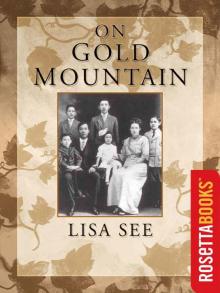 On Gold Mountain: The One-Hundred-Year Odyssey of My Chinese-American Family
On Gold Mountain: The One-Hundred-Year Odyssey of My Chinese-American Family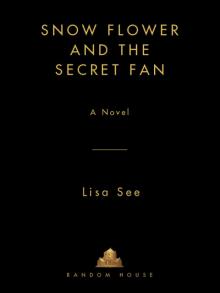 Snow Flower and the Secret Fan
Snow Flower and the Secret Fan Peony in Love
Peony in Love Flower Net
Flower Net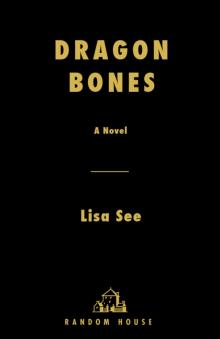 Dragon Bones
Dragon Bones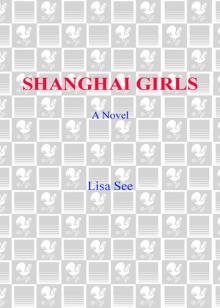 Shanghai Girls
Shanghai Girls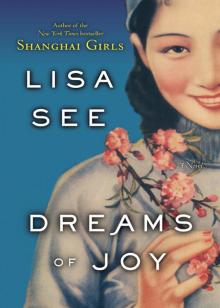 Dreams of Joy
Dreams of Joy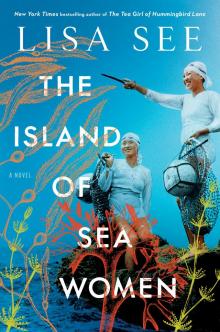 The Island of Sea Women
The Island of Sea Women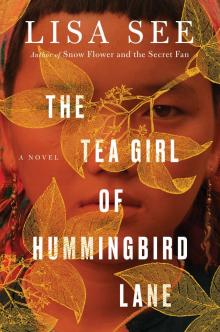 The Tea Girl of Hummingbird Lane
The Tea Girl of Hummingbird Lane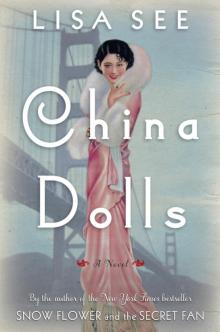 China Dolls
China Dolls The Interior
The Interior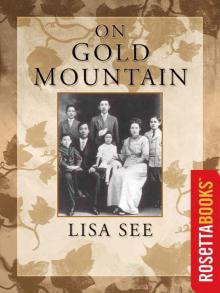 On Gold Mountain
On Gold Mountain